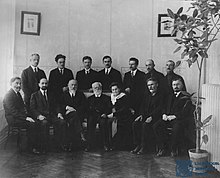Seit Devdariani
Seit Devdariani (Georgian: სეით დევდარიანი) (1879, Kutaisi – 21 September 1937, Tbilisi) was a Georgian philosopher and political activist who was executed during Joseph Stalin's Great Purge.

In the first row: S. Devdariani, Noe Ramishvili, Noe Zhordania, Karl Kautsky and his wife Luise, Silibistro Jibladze, Razhden Arsenidze;
in the second row: Kautsky's secretary Olberg, Victor Tevzaia, , , , ,
Devdariani graduated from the Tbilisi Theological Seminary in 1898. He was involved in Menshevik Party in 1900. During the Russian Revolution of 1917, he was a leading Menshevik in Kharkiv. He was a member of the Georgian National Council from 1917 to 1919 and of the Constituent Assembly of the Democratic Republic of Georgia for the Social-Democrats from 1919 to 1921. After the fall of the Georgian republic, Devdariani became involved in anti-Soviet opposition. Between 1921 and 1924 he was a Chairman of the underground Central Committee of the Georgian Social-Democratic party, in 1922-1924 member of the underground Committee of Independence of Georgia. In 1937, he was arrested in Tbilisi and executed by the Soviet government.[1]
Devdariani was the author of several works on philosophy, including a three-volume history of Georgian thought which was lost after his execution. Only one chapter, that on the 18th-century Catholicos Anton I, survived to be published in 1989.[2]
Literature[]
- Levan Urushadze. Devdariani Seit. In: Encyclopedia "Sakartvelo", Vol. 2, Tbilisi, 2012, p. 356 (In Georgian).
References[]
- ^ Rayfield, Donald (2004), Stalin and His Hangmen: An Authoritative Portrait of a Tyrant and Those Who Served Him, p. 49. Viking Press, ISBN 0-670-91088-0
- ^ Rayfield, Donald (2000), The Literature of Georgia: A History, p. 297. Routledge, ISBN 0-7007-1163-5.
- 1879 births
- 1937 deaths
- People from Kutaisi
- People from Kutais Governorate
- Svan people
- Mensheviks
- Great Purge victims from Georgia (country)
- Philosophers from Georgia (country)
- Social Democratic Party of Georgia politicians
- Executed philosophers
- Historians of philosophy
- Georgia (country) politician stubs
- European philosopher stubs
- Georgia (country) people stubs